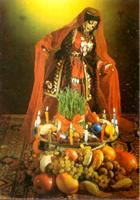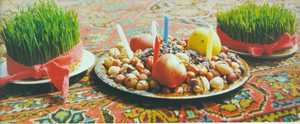Novruz Bayramy

Novruz is associated
with spring, start of agricultural activities, renewal of nature and warm days. This
period being of great importance it caused many traditions and rites associated with
magic, the cult of nature and earth, and belief in the perishing and reviving nature etc. Virtually, celebrations began four weeks before the actual day of festivity.
These four weeks - or, exactly four Wednesdays - were each devoted to one of the four
elements and called correspondingly, although names varied from location to location. They
were: Su Charhshanba (Water Wednesday), Odlu Charhshanba (Flame Wednesday), Torpaq
Charhshanba (Earth Wednesday), Akhir Charhshanba (Last Wednesday). According to folk
beliefs, on Water Wednesday 'water renewed and dead-water came to stir'; the Flame
Wednesday was believed the day of fire rebirth; on Earth Wednesday the earth revived. On
the Last Wednesday the wind opened tree buds and spring arrived.
Another interesting version of the "four Wednesdays" existed in Shirvan area of
Azerbaijan. They were devoted: the first Wednesday to air, the second one - to water, the
third to the earth, and the fourth one - to trees (plants). It meant: on first Wednesday
air warms, water on the second, the third week means the earth to wake, the fourth one
stands for trees and plants to revivify.
 The most important of the
Wednesdays was the Akhir Charhshanba (Last Wednesday before the vernal equinox) and most
of important rites and ceremonies were delivered that day which concerned all the aspects
of human life. Those rites were intended to provide welfare for an individual, his family
and the community in general, to get rid of the old year's troubles and to avert a
calamity.
The most important of the
Wednesdays was the Akhir Charhshanba (Last Wednesday before the vernal equinox) and most
of important rites and ceremonies were delivered that day which concerned all the aspects
of human life. Those rites were intended to provide welfare for an individual, his family
and the community in general, to get rid of the old year's troubles and to avert a
calamity.
First of these essential traditions was the concoction of a ritual food named Samani
(malt) which epitomized fertility of nature and the human race. This food had magical and
cultic importance and was considered sacred ritual food. For instance, Samani was used to
cure infertile women: a dish with sprung wheat for Samani was put on the head of a woman;
another woman poured a little water into the dish cutting the squirt with scissors and
pattered: "Oh, the Power which fecundated this (samani), fecundate this woman."
The process of concoction of Samani was arranged as a religious ritual with only women
admitted. The fire under a Samani kettle was put by "bashi butov gadin" (the
happiest woman of the community) but the entire ceremony was leaded by
"agbirchek" (the most respected woman). The place of the ceremony was closed for
males, those adherent for different faith and "evil-eyed" women. In some regions
Samani was prepared adding a pinch of salt to preserve it from the evil-eye. The entire
ceremony of concoction was called "Samani toyu" (Samani feast) and was
accompanied with ritual dancing and singing.
As to Samani rite's
origin, it is considered to associate both with symbolizing the renewal of nature and the
cult of plants. The latter is also can be well illustrated with the following rite called
"Bailment of Trees" which was delivered on Akhir Charshanba: a male with an axe
approached an unfertile tree as if intending to chop it down. Another person came up and
asked about the reason of his intention and got the answer that the tree did not fruit.
Then, his companion talked him not to chop the tree and bailed it out till next year. The
same way all unfructiferous trees were "bailed out" and none of them was chopped
down.
Other very interesting traditions were associated with water and fire. As to water, its
natural feature to wash the dirt away inhered its function as a means of circumcision and
cleanup. Among such rites was jumping over a stream to purify from the sins of the year
past. Another rite consisted of family members besprinkling each other before going to bed
on Last Wednesday.
Azerbaijan as a cradle of fire-worshipping had rich Novruz traditions associated with fire
which also was believed a way to purify oneself. Making fires on streets, roofs and
elevated points was wide accepted and jumping over a fire on Last Wednesday was considered
compulsory for community members regardless to their age and sex. In Azerbaijan it was
accepted to jump either once over seven fire piles or jump seven times over the same one.
In ancient times the fire was put by an underaged boy using flint and this fire was
believed to be pure.
To pass to the actual day of
Novruz, vernal equinox was proclaimed to have come with flares and gun shooting.
Traditionally, all family members had to stay at home this day, paying no visits and
accepting no guests. They said: "The one that is out on the holiday eve will spend
seven years in wandering".

All days that preceded the holiday were given to profound home-cleaning and concoction of holiday food, which had its own traditions. For instance, it should have include components usually not used. Here the magic "7" has to be mentioned as an element often found in Novruz rites, among which "Yeddi lovun" (seven things) is remarkable. Actually, it consisted of putting seven things - salt, bread, an egg, rue, a piece of coal and a mirror - in a copper tray onto the holiday table and leaving them for 12 days. Conceivably, this tray and things were a sort of gift to the sun.
According to beliefs, plenty of food and holiday dishes would
provide sufficiency of these products in New Year. Some kinds of ritual food had magic
meaning - like eggs which were believed to bear nucleus of new life.
Usually, traditional Azeri plov of several sorts, sweat
cookies and fruits were essential elements of holiday table, although there are variations
according to territorial affiliation.
Nowadays, most of the above traditions are preserved in Azerbaijan, although differing
from region to region. As to Baku, below I provide an extract from "The Old
Baku" by Husseingulu Sarabski which tells a fairy tail of Novruz in Baku.
Novruz was celebrated in Baku much more opulently than other holidays. They began preparation long before. Every Tuesday they build fires in courtyards and at gates. Women burned rue with words of spell to avert all troubles and calamities. Many Baku men were fishermen and their mothers, wives and children added while spelling:
Die away, gilavar, haul, hazri,
My father (or son, or husband) to come home
The lesser time was left till the holiday, the more cheery
became the city. Grocers decorated their shops with mirrors, drawings from Firdowsi's
"Shahnameh" and paper lanterns. They hung a bell at the shops' doors and rang
them aloud to extol their wares.
Children amused grown-up with games and got sweat cookies in reward. Another way to get
dainties was "sallama". Houses in old Baku were mainly one-storied and were easy
to climb. Children (and not only) tied a pouch to a rope and downed it into a chimney.
They never took it back empty cause hosts always put something in.
On the holiday eve all the family gather together. The head of the family, busy with namaz
and prayers, still does not touch the holiday food on the tapis and no one can do that
without his permission. At this particular time his elder sons rushes into the room and
tells that a gunshot announced the holiday has arrived. Father takes his watch out of the
pocket, opens the case and says that there are several minutes left. Then he sits down at
the tapis and tastes the holiday melon. The hostess brings in milk plov and serves
everybody, after which they cleared away the dinner-things.
Open doors of houses told that the host was at home and the house is ready for receive
visitors. On the carpet in the sitting room they served a treat of sweat cokkies -
sheker-burah, sheker-churek, pakhlava, nogul, pistachios, dried sycamine fruits, raisins,
nuts, apples, oranges, etc.
The quests were greeted either by the elder son or a nephew of the host. They sprinkled
the quests' hands with rosewater and ushered them in. A quest was immediately served tea,
traditionally made with additions of cardamom, canella and ginger.
Such visits were paid three days after Novruz. Then women had their celebrations for a
week.

